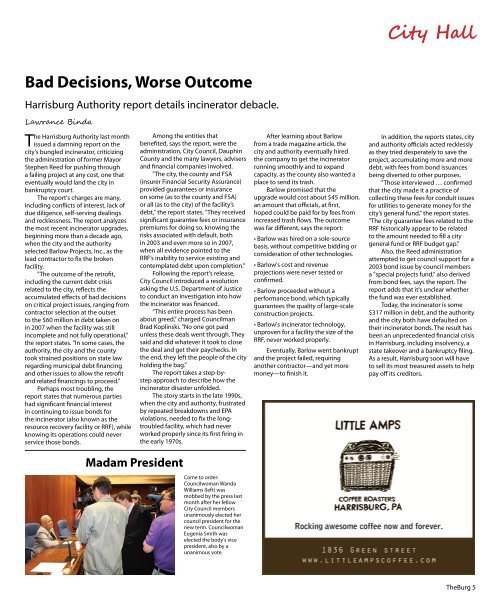February 2012 Greater Harrisburg's Community Newspaper - theBurg
February 2012 Greater Harrisburg's Community Newspaper - theBurg
February 2012 Greater Harrisburg's Community Newspaper - theBurg
You also want an ePaper? Increase the reach of your titles
YUMPU automatically turns print PDFs into web optimized ePapers that Google loves.
City Hall<br />
Bad Decisions, Worse Outcome<br />
Harrisburg Authority report details incinerator debacle.<br />
Lawrance Binda<br />
The Harrisburg Authority last month<br />
issued a damning report on the<br />
city's bungled incinerator, criticizing<br />
the administration of former Mayor<br />
Stephen Reed for pushing through<br />
a failing project at any cost, one that<br />
eventually would land the city in<br />
bankruptcy court.<br />
The report's charges are many,<br />
including conflicts of interest, lack of<br />
due diligence, self-serving dealings<br />
and recklessness. The report analyzes<br />
the most recent incinerator upgrades,<br />
beginning more than a decade ago,<br />
when the city and the authority<br />
selected Barlow Projects, Inc., as the<br />
lead contractor to fix the broken<br />
facility.<br />
"The outcome of the retrofit,<br />
including the current debt crisis<br />
related to the city, reflects the<br />
accumulated effects of bad decisions<br />
on critical project issues, ranging from<br />
contractor selection at the outset<br />
to the $60 million in debt taken on<br />
in 2007 when the facility was still<br />
incomplete and not fully operational,"<br />
the report states. "In some cases, the<br />
authority, the city and the county<br />
took strained positions on state law<br />
regarding municipal debt financing<br />
and other issues to allow the retrofit<br />
and related financings to proceed."<br />
Perhaps most troubling, the<br />
report states that numerous parties<br />
had significant financial interest<br />
in continuing to issue bonds for<br />
the incinerator (also known as the<br />
resource recovery facility or RRF), while<br />
knowing its operations could never<br />
service those bonds.<br />
Among the entities that<br />
benefited, says the report, were the<br />
administration, City Council, Dauphin<br />
County and the many lawyers, advisers<br />
and financial companies involved.<br />
"The city, the county and FSA<br />
(insurer Financial Security Assurance)<br />
provided guarantees or insurance<br />
on some (as to the county and FSA)<br />
or all (as to the city) of the facility’s<br />
debt," the report states. "They received<br />
significant guarantee fees or insurance<br />
premiums for doing so, knowing the<br />
risks associated with default, both<br />
in 2003 and even more so in 2007,<br />
when all evidence pointed to the<br />
RRF’s inability to service existing and<br />
contemplated debt upon completion."<br />
Following the report's release,<br />
City Council introduced a resolution<br />
asking the U.S. Department of Justice<br />
to conduct an investigation into how<br />
the incinerator was financed.<br />
“This entire process has been<br />
about greed," charged Councilman<br />
Brad Koplinski. "No one got paid<br />
unless these deals went through. They<br />
said and did whatever it took to close<br />
the deal and get their paychecks. In<br />
the end, they left the people of the city<br />
holding the bag."<br />
The report takes a step-bystep<br />
approach to describe how the<br />
incinerator disaster unfolded.<br />
The story starts in the late 1990s,<br />
when the city and authority, frustrated<br />
by repeated breakdowns and EPA<br />
violations, needed to fix the longtroubled<br />
facility, which had never<br />
worked properly since its first firing in<br />
the early 1970s.<br />
After learning about Barlow<br />
from a trade magazine article, the<br />
city and authority eventually hired<br />
the company to get the incinerator<br />
running smoothly and to expand<br />
capacity, as the county also wanted a<br />
place to send its trash.<br />
Barlow promised that the<br />
upgrade would cost about $45 million,<br />
an amount that officials, at first,<br />
hoped could be paid for by fees from<br />
increased trash flows. The outcome<br />
was far different, says the report:<br />
• Barlow was hired on a sole-source<br />
basis, without competitive bidding or<br />
consideration of other technologies.<br />
• Barlow's cost and revenue<br />
projections were never tested or<br />
confirmed.<br />
• Barlow proceeded without a<br />
performance bond, which typically<br />
guarantees the quality of large-scale<br />
construction projects.<br />
• Barlow's incinerator technology,<br />
unproven for a facility the size of the<br />
RRF, never worked properly.<br />
Eventually, Barlow went bankrupt<br />
and the project failed, requiring<br />
another contractor—and yet more<br />
money—to finish it.<br />
In addition, the reports states, city<br />
and authority officials acted recklessly<br />
as they tried desperately to save the<br />
project, accumulating more and more<br />
debt, with fees from bond issuances<br />
being diverted to other purposes.<br />
"Those interviewed … confirmed<br />
that the city made it a practice of<br />
collecting these fees for conduit issues<br />
for utilities to generate money for the<br />
city’s general fund," the report states.<br />
"The city guarantee fees related to the<br />
RRF historically appear to be related<br />
to the amount needed to fill a city<br />
general fund or RRF budget gap."<br />
Also, the Reed administration<br />
attempted to get council support for a<br />
2003 bond issue by council members<br />
a "special projects fund," also derived<br />
from bond fees, says the report. The<br />
report adds that it's unclear whether<br />
the fund was ever established.<br />
Today, the incinerator is some<br />
$317 million in debt, and the authority<br />
and the city both have defaulted on<br />
their incinerator bonds. The result has<br />
been an unprecedented financial crisis<br />
in Harrisburg, including insolvency, a<br />
state takeover and a bankruptcy filing.<br />
As a result, Harrisburg soon will have<br />
to sell its most treasured assets to help<br />
pay off its creditors.<br />
Madam President<br />
Come to order:<br />
Councilwoman Wanda<br />
Williams (left) was<br />
mobbed by the press last<br />
month after her fellow<br />
City Council members<br />
unanimously elected her<br />
council president for the<br />
new term. Councilwoman<br />
Eugenia Smith was<br />
elected the body's vice<br />
president, also by a<br />
unanimous vote.<br />
TheBurg 5









